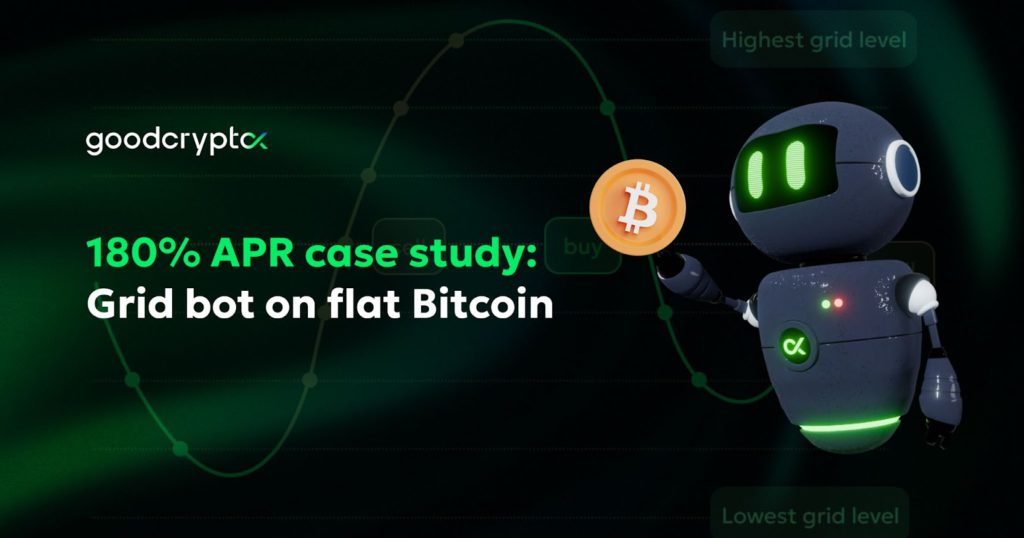As many people believe, trading is all about market volatility – the constant price spikes and dips give you endless opportunities to profit from. But does it mean you can’t take advantage of flat or sideways markets?
Actually, you can!
In this post, we will show you one of the many successful Grid trading cases from our founder, Max. You will find out how he managed to achieve a 75% ROI, or nearly 180% APR from Bitcoin’s in-range volatility in five months, even though its price barely moved since that time.
This is a blog-post adaptation of our recent video case study on YouTube. So, if you prefer watching over reading, feel free to check it out 👇
Now, onto the case review.
Grid bot results review
Let’s start with the bot’s results and profitability. As you can see on the screenshot, Max has made over $4,500 in PnL with a total invested amount of around 0.274 $BTC (or about $28K). Considering the fact he used a 10x leverage during Grid trading, the actual invested amount was $2,800.
However, to avoid liquidation in case the price goes out of the range, Max held nearly $6,000 in his Gate.io account. As a result the actual ROI of the Grid bot has made around 75% return within five months of operating.
And the best part? Even though Bitcoin price made quite a bumpy journey over those five months, it barely moved from its initial level when the bot was launched. In December 2024, BTC was trading between $90K and $100K, while the current $BTC price is slightly above $100K.
So, if Max had simply been HODLing $BTC over those five months, he would’ve ended up with almost zero ROI. Instead, he chose to earn a solid profit from Bitcoin, even in such relatively stable market conditions. Pretty interesting, right?
Now, let’s move to the bot’s settings:
grid bot settings:
- Pair: $BTC/USD;
- Leverage: 10x;
- Grid mode: Long;
- Levels amount: 35;
- Order size: 750 contracts/USD;
- Highest Grid level: 111,461;
- Lowest Grid level: 77,985;
- Take profit: none
- Stop Loss: 50% from the lowest grid level ($39K).
Among the important details to highlight are the grid price range and stop loss order setting. When configuring a grid trading bot, correctly estimating the potential price range and setting Stop Loss is the most crucial part of the grid bot setup process that determines the bot’s overall success.
For example, if you set a too tight price range and Stop Loss for the bot, you are risking to hit your stop loss before the price starts rebounding. In this case as well – the last grid order was set at $78K, but the price got slightly out of the range, but shortly came back to $100K level without hitting Max’s Stop Loss. As a result, the bot’s PnL climbed back to where it was and generated such an impressive return.
On the other hand, if you choose a grid range that’s too wide, you’ll likely earn less profit than you could have if you set the range correctly, simply because fewer orders will be triggered.
When it comes to setting a stop loss that’s too wide, you not only increase the potential amount of funds at risk, but also force yourself to keep more capital in your account to avoid liquidation. This, in turn, reduces your potential profitability, especially in leveraged trading.
And finally, don’t forget to keep extra funds in reserve when running a grid bot, especially in futures trading, to cover potential price movements outside your grid range. By default, when setting up the bot, goodcryptoX displays the amount of funds required to cover all grid levels. However, the actual amount of $USDT needed for the price to drop to your stop loss level while still avoiding liquidation will likely be higher.
For example, imagine you use a 10x leverage. Say you need around 2,625 $USDT to cover this grid of orders, deposit strictly this number and set a Stop Loss of 20% from the last grid order.
In this case, you’re guaranteed to face liquidation before the price reaches your 20% stop loss level, leading to unexpected losses that can’t be recovered. To prevent this, you need to significantly increase the amount of funds in your account and ensure your position stays open until the stop loss is actually triggered.
Conclusion
-
goodcryptoX bots can help you profit not only in trending markets but also during sideways movements, thanks to our grid trading bot. We shared a real example of a successful setup by our founder, who achieved an impressive 75% ROI in just five months, even though Bitcoin’s price remained nearly unchanged throughout that period.
If you’d like to explore more of our trading case reviews, make sure to subscribe to our YouTube channel or check out Max’s Telegram channel, “DCA Tips from GoodCrypto.” While most of the cases there focus on DCA trading, some cover Grid bot strategies as well.
Enjoy the grid trading and good luck! 🤞
